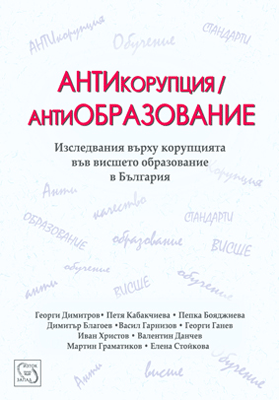
We kindly inform you that, as long as the subject affiliation of our 300.000+ articles is in progress, you might get unsufficient or no results on your third level or second level search. In this case, please broaden your search criteria.

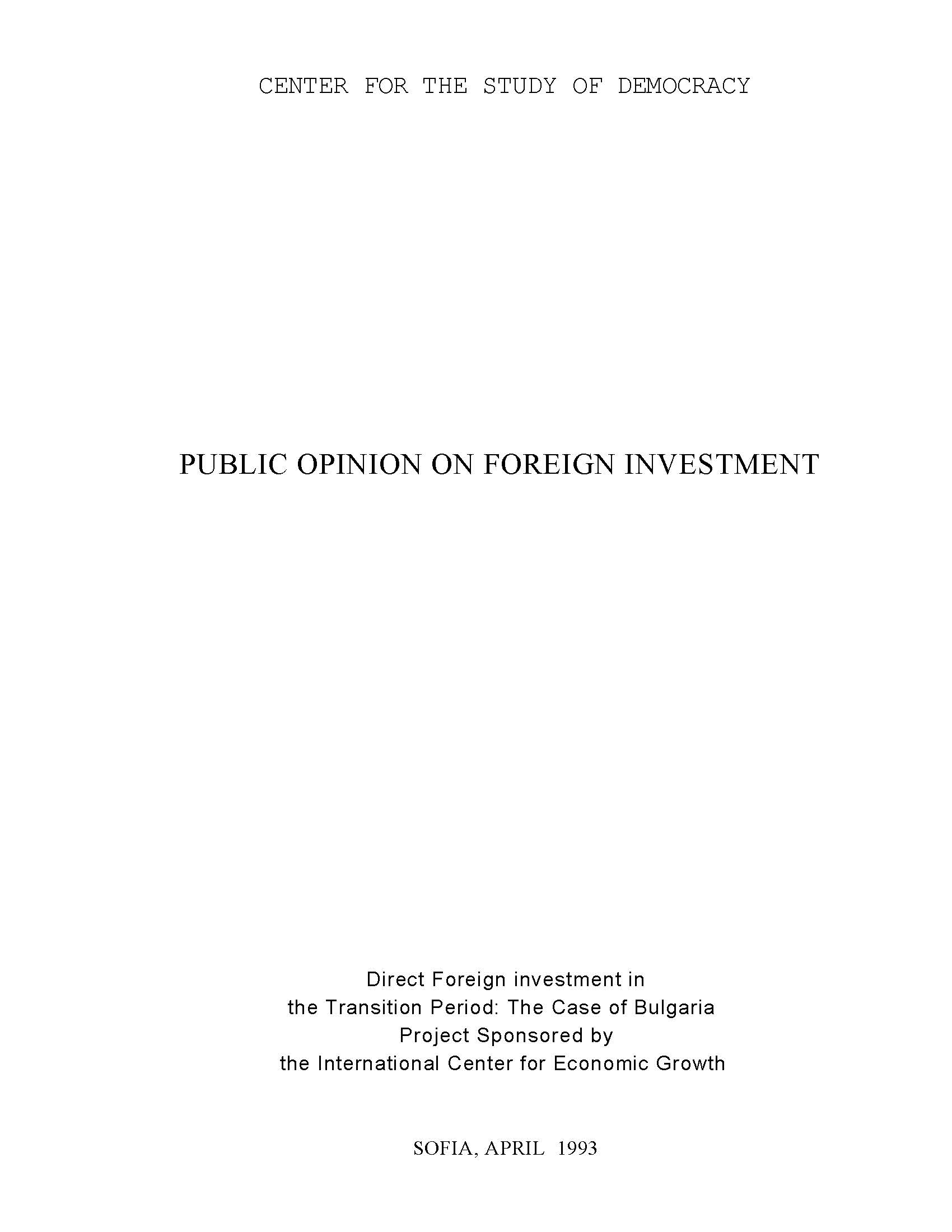
Compared with the other central and eastern European countries - Hungary, Czech and Slovak republics and Poland, foreign investment turns to be a new phenomenon for the Bulgarian economy. Thus the public opinion on it is in a process of forming. The role of researchers, different studies, the mass-media and foreign investors, themselves, in inspiring public support and acceptance of foreign investment is of great importance. This will contribute to the success of investments that have been made as well as to their further attraction to the country.
More...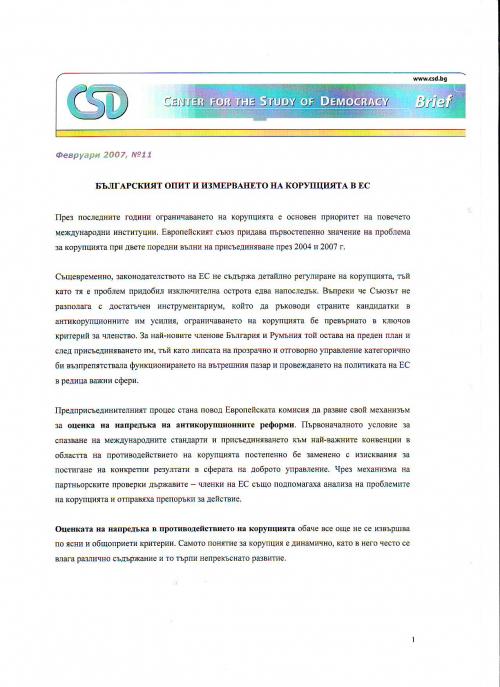
In recent years, curbing corruption is a top priority of most international institutions. The European Union attaches paramount importance to the problem of corruption in the two successive waves of accession in 2004 and 2007. The pre-accession process has prompted the European Commission to develop its own mechanism to assess the progress of anti-corruption reforms. Like many other key areas for the functioning of the internal European market, the development of EU anti-corruption policy has logically led to the creation of a single European methodology for defining standards for measuring corruption.
More...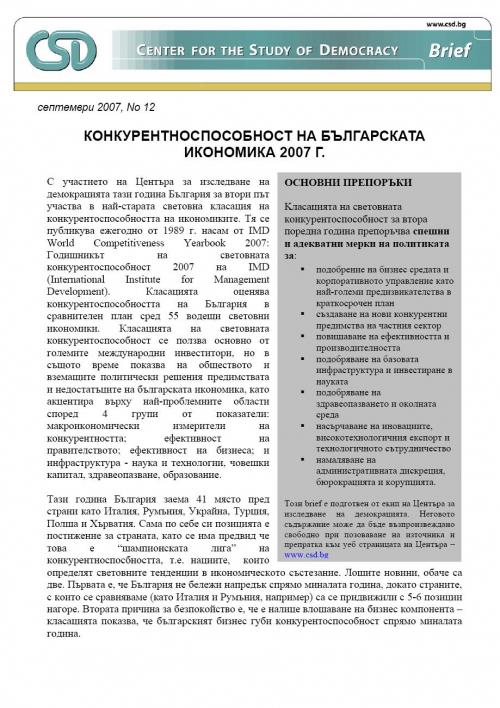
With the partnership of CSD this year Bulgaria was included for the second time in the World's oldest and most comprehensive annual report on competitiveness, the IMD World Competitiveness Yearbook 2007. It has been published without interruption since 1989 by IMD (International Institute for Management Development). Bulgaria’s competitiveness was covered and ranked together with 54 other leading world economies. This year Bulgaria came 41st on the scoreboard, surpassing Italy, Romania, Ukraine, Turkey, Poland, and Croatia among others. The position is an achievement in its own right, considering that the country is measured up against the champion nations setting the trends in the world economic competition. In 2007 Bulgaria has largely kept its position compared to the previous year, but its business efficiency has declined. Meanwhile, the country’s overall economic performance has improved.
More...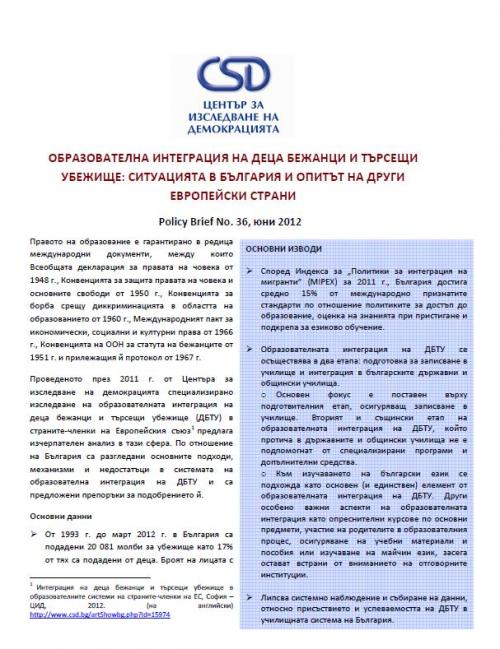
This analysis represents the results of a specialised study of the educational integration of refugee and asylum-seeking children (RASC) in the Member States of the European Union, conducted in 2011 by the Center for the Study of Democracy within the framework on the INTEGRACE project. With regard to Bulgaria, the main approaches, mechanisms and deficiencies in the system for educational integration of RASC were presented and recommendations for its improvement were given.
More...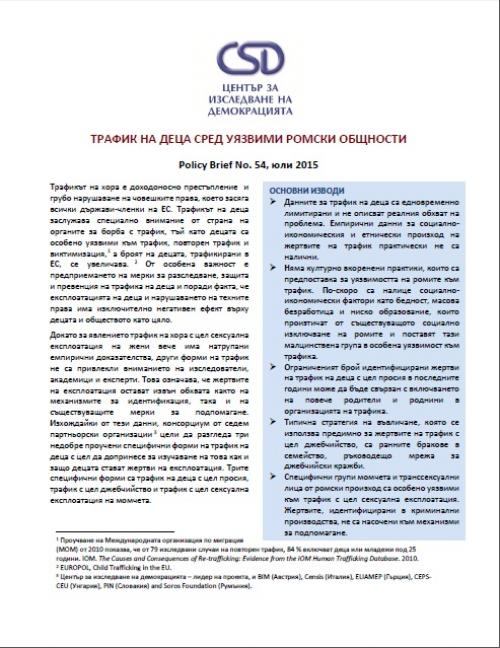
Trafficking in persons is a lucrative crime and a gross human rights violation, which affects all EU Member States. Trafficking in children merits special attention of anti-trafficking efforts as children are especially vulnerable to trafficking, re-trafficking and victimisation and the number of children trafficked throughout the EU is on the rise. Investigation, protection and prevention measures for child trafficking are especially needed as the exploitation of children and violation of their rights have dramatic negative effects on children and society as a whole. While there is some empirical evidence on trafficking in human beings for the purpose of sexual exploitation of women, other forms of trafficking have not drawn attention of researchers, academics and policy makers. This means that victims of exploitation fall outside the radar of identification and thus cannot access the available assistance. Having this in mind, a consortium of seven partner organisations3 sough to explore three specific under-researched forms of child trafficking in order to contribute to the knowledge on how and why children fall prey to exploitation. The three forms studied are child trafficking for the purpose of begging exploitation, child trafficking for the purpose of pick-pocketing and child trafficking for the purpose of sexual exploitation of boys.
More...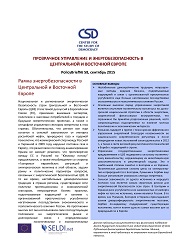
The national and regional energy security of Central and Eastern European (CEE) countries has become a hot topic of discussion in the EU recently, focusing the attention of experts, policy makers, and the general public on ongoing and future energy projects but also on the features of energy governance in these countries. The interruption of gas supplies to Europe as a result of the Russian-Ukrainian pricing dispute in 2009, the continuing Russian-Ukrainian crisis after the annexation of Crimea, and the EU-Russia controversies regarding the South Stream pipeline project, as well as Gazprom’s non-compliance with the EU regulations in several anti-trust cases in the past few years are the major cornerstones that shape the CEE energy security framework and policy options as the region remains heavily dependent on Russian oil, gas, and nuclear technology. At the same time, the fragile democratic traditions in the CEE countries, the existing networks of political protectionism and economic oligarchy, and the opaque business practices nurtured by corruption and links with organized crime, have been reinforced by the negative implications of Russian economic and geo-political influence. Russia has exploited its dominant position in the energy market and its long-term links with certain political and economic groups to shape political decisions across the region according to its own interests, but often to the detriment of the home country consumers. The current review of energy security risks in four selected CEE countries, two energy poor – Bulgaria and Serbia, and two energy-resourced– Romania and Ukraine, assesses the factual situation per se and the transparency and accountability of energy policy governance in the region.
More...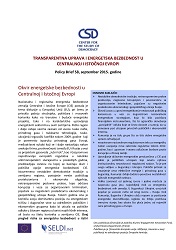
The national and regional energy security of Central and Eastern European (CEE) countries has become a hot topic of discussion in the EU recently, focusing the attention of experts, policy makers, and the general public on ongoing and future energy projects but also on the features of energy governance in these countries. The interruption of gas supplies to Europe as a result of the Russian-Ukrainian pricing dispute in 2009, the continuing Russian-Ukrainian crisis after the annexation of Crimea, and the EU-Russia controversies regarding the South Stream pipeline project, as well as Gazprom’s non-compliance with the EU regulations in several anti-trust cases in the past few years are the major cornerstones that shape the CEE energy security framework and policy options as the region remains heavily dependent on Russian oil, gas, and nuclear technology. At the same time, the fragile democratic traditions in the CEE countries, the existing networks of political protectionism and economic oligarchy, and the opaque business practices nurtured by corruption and links with organized crime, have been reinforced by the negative implications of Russian economic and geo-political influence. Russia has exploited its dominant position in the energy market and its long-term links with certain political and economic groups to shape political decisions across the region according to its own interests, but often to the detriment of the home country consumers. The current review of energy security risks in four selected CEE countries, two energy poor – Bulgaria and Serbia, and two energy-resourced– Romania and Ukraine, assesses the factual situation per se and the transparency and accountability of energy policy governance in the region.
More...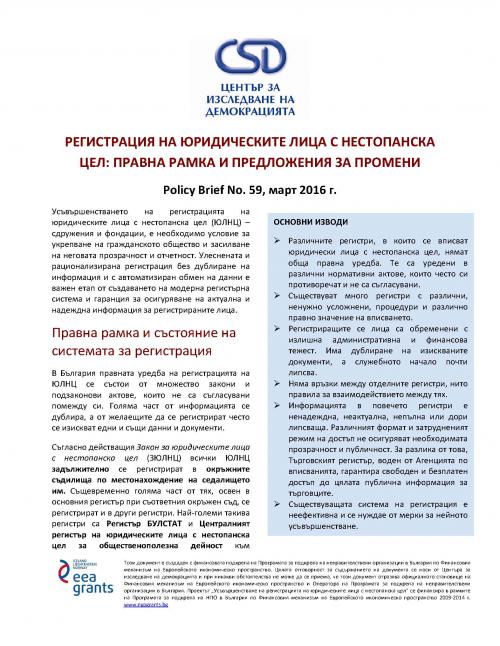
Improvement of registration of non-profit organisations (NPOs) – associations and foundations, is a necessary precondition for strengthening the civil society and increasing its transparency and accountability. An easy and simple registration procedure, with no duplication of information and functioning automatic exchange of data, is an important stage in the establishment of a modern registration system. It also guarantees the availability of reliable and up-to-date information on all registered entities.
More...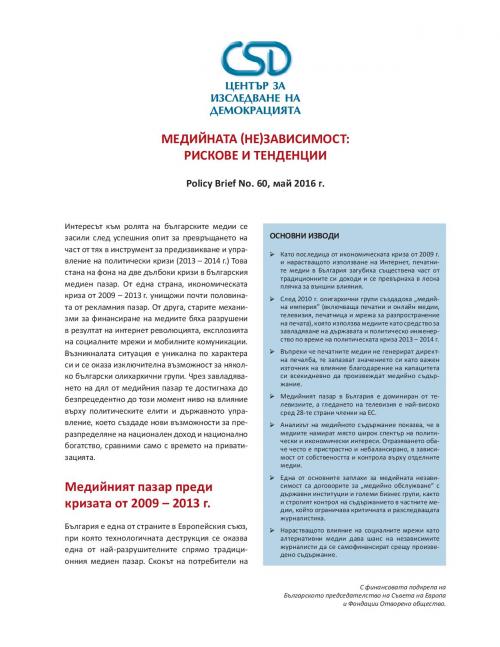
The role of Bulgarian media in public life came under scrutiny after several media outlets were used as an instrument for triggering political crises and for political engineering (2013 – 2014). At that time, the Bulgarian media market was experiencing the impact of two negative trends. On the one hand, the economic crisis of 2009 – 2013 had cut advertising revenues by half. On the other, the old models of media financing were diminished by the use of digital technologies and the explosive growth of social networks and mobile communications. The loss of financial sustainability by the media presented unique opportunities for Bulgarian oligarchic groups. By accumulating a significant share of the media market, they reached an unprecedented level of political influence (including direct influence on the legislative, executive and judicial powers). The media was used as an instrument for state capture that could present severe security and economic risks.
More...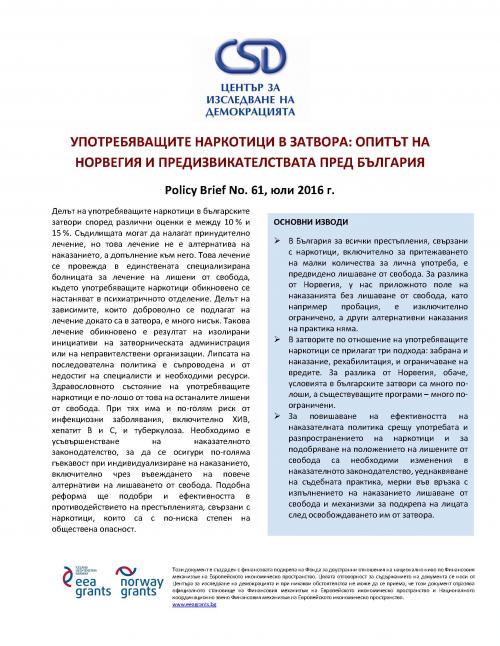
For all criminal offences related to drugs, even for possession of small quantities intended for personal use, the main sanction according to Bulgarian criminal law is imprisonment. Unlike in Norway, non-custodial penalties in Bulgaria such as probation have extremely limited scope of application for drug-related offences. At the same time, other alternatives to imprisonment are virtually non-existent.
More...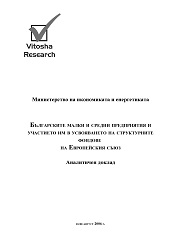
After Bulgaria joins the EU in 2007 the country will receive access to the Structural Funds (SF) and the Cohesion Fund of the European Union (EU), which are the main instruments for reducing the economic and social disparities within the Union. The effective management of these proceeds entails good knowledge of the EU Funds’ requirements and thorough preparation at national, regional and local levels both by the public and private sectors, including the small and medium-sized enterprises (SMEs). In 2000 in Lisbon, the European Commission and the EU Member States agreed upon the ambitious goal that by 2010 the European Union would have to become the most dynamic knowledge-based economy in the world . The instruments and mechanisms to achieve this goal have been outlined in the Lisbon Strategy of the EU. In 2005, an interim review on the progress of the Lisbon Strategy was done, based on which it was concluded that the Union was falling behind in some of its basic parameters, and that the gap between the EU and the leading innovative world economies of the United States and Japan was broadening.
More...
In prison, certain groups of inmates are subject to disadvantages due to specifics of their origin, gender, sexual orientation, age, etc. These groups usually need special treatment, which is not always provided, which leads to unequal treatment and violation of their rights. This handbook examines the situation of such vulnerable groups within the prison systems of Belgium, Bulgaria, Germany, Lithuania and Spain. Starting from the classification of the UN Handbook on Prisoners with special needs and looking at the different national contexts, the authors identify different groups as vulnerable in different countries. In order to encompass as many groups as possible, their list was extended to include some particularly marginalised groups, such as sex offenders, prisoners with disabilities, etc. Each group is viewed in context, explaining the situations of vulnerability both generally and in the selected countries. From one side, the handbook presents the efforts for compensation of vulnerabilities in every country available in the legislation or provided by prison authorities or other actors. From the other side, it identifies the gaps in the measures and practices, which vary both from country to country and from group to group.
More...
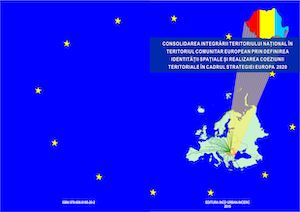
The chapter presents a socio-demographic analysis of the population from the Romanian territory adjacent to the Danube.
More...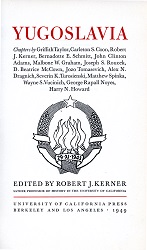
In order to gain a clear understanding of the social structure of the Yugoslav state, the origins of South Slav society and its subsequent evolution must be examined. Two points should be borne in mind: first, Yugoslav society is now and always has been predominantly rural; second, social relations are based primarily on ancient Slavic traditions as modified by the codes of the medieval kings.
More...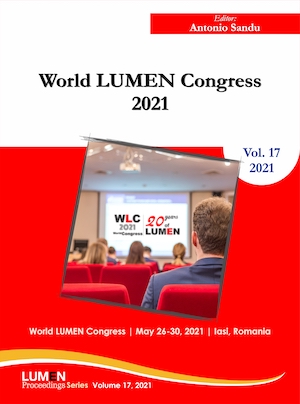
Young people are often exposed to various life situations that gradually come during their lives. The quality of life of young people in Slovakia is conditioned by several areas of social policy therefore, these issues are very important for research. The aim of the paper is to point out the analysis of selected factors (areas) that affect the life situations of young people in Slovakia. We pay attention to the areas of support and protection of the establishment of young families and preparation for parenthood, support of employment of young people and support of housing policy of young people. In this paper we work with the analysis of secondary data, which relate to selected monitored areas focused on young people in Slovakia. The data we use in the article are of a quantitative character. We will use the method of analysis, synthesis, induction and deduction to achieve the set goals. Another key method that we use in the paper is descriptive statistics (Rimarčík, 2007; Chajdiak, 2010; Marek, 2015). In Slovakia, the issue of young people often appears only as a political issue. In scientific discourses, the issue of young people is addressed in isolation, as evidenced by several contributions from the authors. The authors of this paper present the problems of selected factors (areas) influencing the perspectives and reality of young people in Slovakia in an integrated manner.
More...
Examining the links between performance and financial issues has been, and still is, subject of a great number of researches both in the business and in the non-profit environment. In this respect, the world of sports has not been bypassed either, using concepts and / or instruments from accounting, economics or statistic areas in order to analyse a firm or an NGO in the sport industry and his success. The present study represents one of the first attempt to value the Romanian sports federations’ activity which is not based solely on the scores attained following places and medals won by athletes participating in the national and international competition system. And it is intended to identify an appropriate methodology to highlight how efficient the sports federations have been in 2019 year, reporting the results obtained to the resources used, from a domestic perspective (meaning the participation in national sports events and the scores obtained). This paper addresses 12 Romanian sports federations (out of 75 federations on sport branches) and their efficiency, through the lens of several input, output and outcome indicators, using public data gathered from various sources - the Romanian Ministry of Finance, the National Institute of Statistics, the Romanian Ministry of Youth and Sports. Using statistical tools, such as Spearman rank correlation, as well as statistical methods, such as standardization, we developed an efficiency calculation methodology, which could be used to support managerial team to improve and / or reshape federations' activities, if necessary.
More...
The research follows the evolution of the number of legitimate athletes, of the number of coaches and of the number of departments (clubs) within two sports federations: the Romanian Basketball Federation and the Romanian Handball Federation. The statistics show a different dynamic regarding the number of legitimate athletes in the period 1992-2019, the study making a comparison between the two federations in terms of management programmes and the impact thereof on the dynamics of the number of athletes, coaches and number of departments.The research started from the hypothesis that the type of management and marketing applied at the federation level is very important because it directly influenced the existence of the number of clubs, coaches and implicitly the number of legitimate athletes, in the context in which both federations are national structures under the control of the Ministry of Youth and Sports and funded from a single source, to a large extent. The data were collected from the National Institute of Statistics of Romania, from the Ministry of Youth and Sports and from the website of the two Federations. The study refers to certain differences in the application of management and marketing strategies and the evolution of the 2 federations. The research also offers some explanations from a social, economic and political perspective of the dynamics of the compared parameters.
More...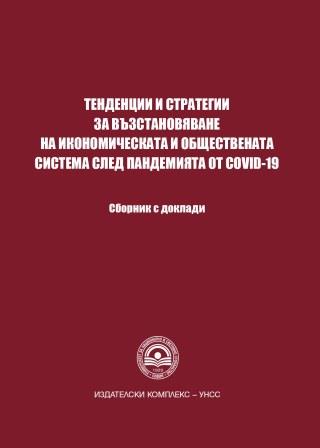
The aim of the present study is to investigate the influence of distrust in governmental institutions and of limited (or blocked) ability for personal agency and control in everyday-life activities during the COVID-19 pandemic as factors that determine the advent of psychic problems such as depression, anxiety and stress. 471 participants filled surveys and questionnaires that measured the two independent and three dependent variables. Results showed a statistically significant link between the distrust in governmental institutions because of their enforced policies and social measures for managing the pandemic, and higher levels of anxiety and stress but not of depression. The limited (or blocked) ability for personal agency and control in everyday-life activities has a statistically significant association with higher levels of depression, anxiety and stress. Several limitations of the present study and directions for future investigations on the subject are discussed, together with possible strategies for improving people’s psychic health and well-being under the conditions of the global pandemic.
More...